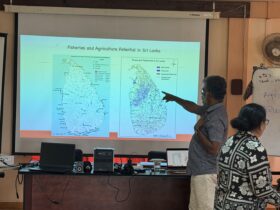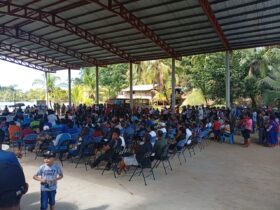Inputs made by: Contribution of International Collective in Support of Fishworkers (ICSF) to outcomes of the Rio+20 Conference
Made at: United Nations Conference on Sustainable Development, Rio+20. 1 November 2011.
Inputs for Compilation Document
1. Introduction
1. ICSF welcomes the objective of the United Nations Conference on Sustainable Development: Rio+20 to secure renewed political commitment for sustainable development.We welcome its focus on ‘green economy in the context of sustainable development and poverty eradication’ (GESDPE) and ‘institutional framework for sustainable development’ (IFSD). We understand GESDPE integrates economic, environmental and social pillars of sustainable development. In the context of marine resources, GESDPE, we assume, also recognizes ‘blue economy’or sustainable and equitable distribution of ocean resources.
2. ICSF is concerned that since the 1992 United Nations Conference on Environment and Development (UNCED) the dominant model of development has encompassed a very narrow conceptualisation of development that has emphasised industrial grow that the expense of the social and environmental components of sustainable development. Similarly, economic values have come to dominate discussions on green and blue economy, minimizing the importance of social, cultural and spiritual values inherent in the quest fora sustainable and equitable global society.
2. Expectations for the outcome of Rio+20:
2. 1 Rio+20 would uphold human rights approach towards sustainable use of fisheries
3. Rio+20 should be seen as an opportunity to strengthen the social pillar of sustainable development.Towards accelerating progress on this front, principles of equity and respect for human rights need to be upheld.The fishery sector needs greater attention from a human rights perspective considering the vulnerability of the sector to resource over exploitation, unsafe working conditions, and natural disasters. Fishery conservation and management measures that are insensitive to social dimensions can be a threat to sustainable fishery and GESDPE. It is imperative, therefore, to make rights-based approaches to sustainable use of fishery resources consistent with a human rights approach.
4. Towards establishing greater parity between environmental, economic and social dimensions of sustainable fisheries, Rio+20 should support fishers and fishworkers, including fishery-dependent indigenous peoples, towards fully securing their human rights in relation to the development, use and management of aquatic(inland and marine), riparian and coastal ecosystem goods and services.
5. To improve working conditions and safety of fishing operations, and to provide social security, Rio+20 should call upon States to ratify the ILO Work in Fishing Convention, 2007, which is of direct benefit to fishers on board fishing vessels and to promoting and sustaining decent work in the fishery sector. In addition, Rio+20 should help address existing gaps and bring important provisions of post-Earth Summit international developments like the Convention on Biological Diversity, the United Nations Fish Stocks Agreement, and the FAO Code of Conduct for Responsible Fisheries to benefit fishers and fishworkers, and fishing communities.
2.2 Rio+20 would exert pressure to uphold obligations forfishery governance
6. The environmental and social problems identified by Agenda 21 facing fisheries under national jurisdiction such as local overfishing, unauthorized incursions by foreign fleets, ecosystem degradation, excessive fleet sizes, insufficiently selective gear, and increasing competition between artisanal and large-scale fishing, and between fishing and other types of activities, continue to remain unresolved in many parts of the world.The share of fully exploited, overexploited, depleted or recovering fish stocks has reached the highest percentage recorded since the mid-1970s.This is in spite of many States ratifying the 1982 United Nations Convention on the Law of the Sea, the 1995 United Nations Fish Stocks Agreement, and adopting legislation and policies that conform to the 1995 FAO Code of Conduct for Responsible Fisheries.Traditional and customary rights of fishing communities and indigenous peoples continue to be threatened.The Rio+20 should seek States to honour their legal commitments, especially towards sustainable use of fishery resources.
7. Inadequate commitment to international obligations is most evident as reflected in thestate of poor governance of natural resources. Good governance, although recognized as essential for sustainable development, as pointed out by the 2002 Monterrey Consensus of the International Conference on Financing for Development, still remains elusive in many parts of the world, especially in regard to conservation and sustainable use of fishery resources.
8. In the context of the green economy,there should,in relation to fishery, be a concerted effort to promote capacity and effort reduction, as well as energy optimisation, programmes. In this context, destructive and high external input fishing methods like bottom trawling should be prohibited in a time-bound manner.While considering the appropriate model relevant to sustainable use of fishery resources, larger fishing vessels may be considered in a fishery only after exhausting the possibility of employing smaller vessels – an approach that may be called “scale subsidiarity” – with due consideration for safety of fishing operations and for the safety and working conditions of fishers on board.
9. Rio+20 should bring greater attention to governance issues at the local, national, regional and international levels. Context-specific governance structures where governments and communities, fishers, civil society, fishworkers and indigenous groups collaborate for fishery conservation and management should be promoted. States should financially assist formation of local committees, cooperatives and trade unions, and encourage traditional associations and indigenous councils to actively participate in fishery governance, towards strengthening the bulwarks of sustainable development.
10. Rio+20 should encourage greater recognition ofcollective rights in themanagementof fisheries such as community-based fishery management regimes. Rio+20 should discourage privatization of fishery resources through quota management and other systems that confer property rights to individuals since this would undermine the social pillar of sustainable development, a key determinant in the success of sustainable development, especially in multi- species, labour-surplus fishing economies that are fully dependent on fisheries for their livelihood.
11. Whilst supporting protected areas and marine reserves in reversing overfishing pressures, habitat destruction and conservation of biodiversity, it is important to adopt these measures within the framework of sustainable use of living resources that integrates the fundamental principles of environmental justice, social justice and human rights in consultation with the resource users, especially small-scale, artisanal, indigenous and traditional fishing communities.
2.3 Rio+20 would recognize sustainable forms of artisanal and small-scale fisheries
12. In the context of sustainable fisheries, artisanal and small-scale fisheries are more sustainable and equitable, and are recognized as a low input system. Rio+20 may therefore seek States’support to ensure future growth in capture fishery production originates from enhanced small-scale fisheries that do not harm ecosystem health and respect ecological limits, and ensure an equitable distribution of benefits. In the context of green and blue economy, artisanal and small-scale fisheries can make significant contributions to sustainable development, particularly in labour-surplus fishing economies by sustaining livelihoods,quality of life and culture of coastal and inland fishing communities, and indigenous peoples.Artisanal and small-scale fisheries may also be seen as a vehicle for poverty eradication andfood security and for promoting access to resources for women and marginalised groups.
13. Agenda 21, the UN Fish StocksAgreement and the 1995 FAO Code of Conduct for Responsible Fisheries have recognized the importance of protecting the rights of subsistence, small-scale and artisanal fishers and fishworkers to a secure and just livelihood. Rio+20 should re-emphasize the importance of small-scale, artisanal fisheries to coastal communities and in promoting sustainable use of fishery resources,as recognized in these instruments, albeit overlooked in the Johannesburg Plan of Implementation.
14. It should be ensured that pillars of sustainable development not only draw elements from legal instruments but also from civil society initiatives. In this regard, Rio+20 should draw upon elements of sustainable development from civil society statements such as the 2008 Bangkok Statement of Civil Society on Small-Scale Fisheries and the “Shared Gender Agenda” emanating from the 2010 ICSF Workshop on defining a gender agenda for sustainable life and livelihoods in fishing communities, Mahabalipuram, India.
15. The proposed FAO Voluntary Guidelines on Securing Sustainable Small-Scale Fisheries (VG-SSF) should be seen as an opportunity to complement the FAO Code of Conduct for Responsible Fisheries, especially to build bridges between sustainable use of fishery resources and human rights as enshrined in the Universal Declaration of Human Rights, the Convention on the Elimination of All Forms of Discrimination Against Women, and other relevant legal instruments. Rio+20 should encourage States to actively participate in the process of developing VG-SSF to benefit small-scale fishworkers and fishing communities.
2.4 Rio+20 would promote nutritional security of the poor
16. Rio+20 should recognize the role small indigenous fish species play in nutritional security in several Asian countries, especially to address micro nutrient deficiency in the diet of the poor. In this context, conservation and protection of micro nutrient-dense small indigenous fish species in the wild should be promoted. It is also important to recognize and document traditional knowledge in regard to nutritional and therapeutic use of fish-based traditional food.
2.5 Rio+20 would promote extensive and modified extensive aquaculture
17. In promoting aquaculture production in the context of the GESDPE, herbivorous species in extensive and modified extensive aquaculture systems should be given priority Local and domestic food security should be the primary focus of aquaculture development. Particular attention should be given to developing systems that use native species, and prohibiting systems that rely on exotic species.
3. Views on implementation
18. Rio+20 should develop plans of implementation, set targets, develop indicators and establish monitoring mechanisms, interalia, for achieving social goals of sustainable development, especially for sustainable use of natural resources, including fisheries. There should be systematic follow-up post-Rio+20 through special sessions. An independent monitoring body may be set up with representation of indigenous and local communities to ensure that funds committed to realize ocean-related goals of sustainable development are utilized in a socially-just manner. Capacity-building of traditional, local and national institutions as well as State agencies should be undertaken towards better integrating economic, environmental and social pillars of sustainable development. Redress mechanisms may be established in the event of abuse of human rights of indigenous and local communities, and other legitimate users of natural resources, during the course of implementing sustainable development programmes.
Contact
Chandrika Sharma, Executive Secretary
27 College Road, Chennai 600 006, India
Website: www.icsf.net
Email: icsf@icsf.net





Leave a Reply